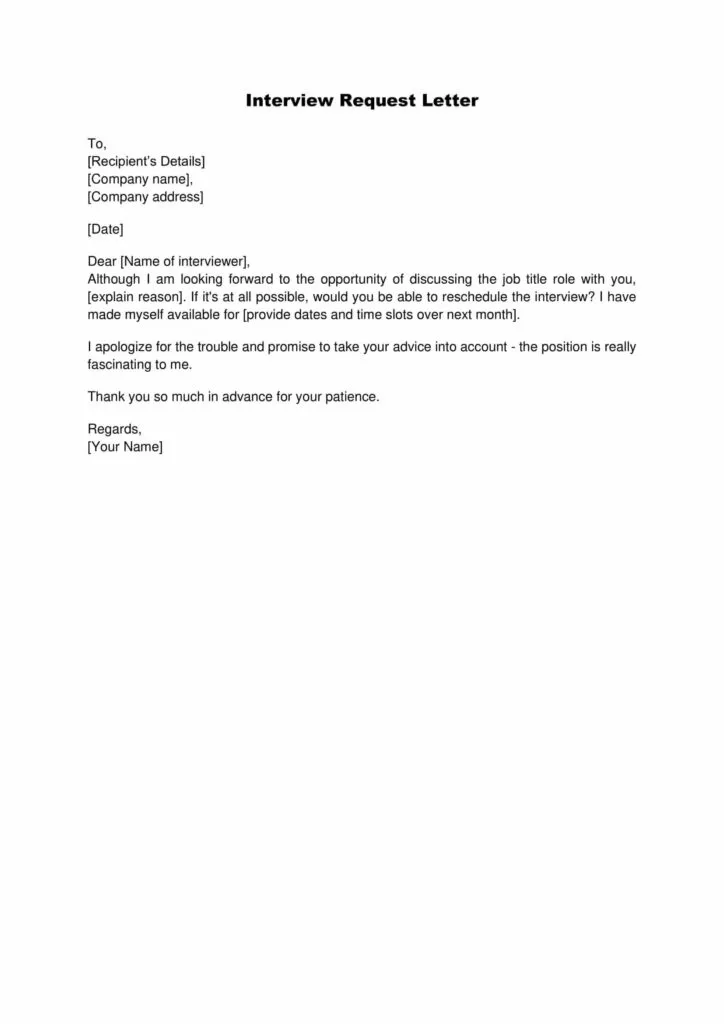What Is a Cover Letter?
A cover letter is a crucial document that accompanies your resume when applying for a job. It serves as your introduction to the hiring manager, providing a space for you to elaborate on your qualifications, express your interest in the position, and showcase your personality. Unlike a resume, which offers a snapshot of your experience and skills, a cover letter allows you to tell a story, explaining why you’re a perfect fit for the specific role and the company. It is a personalized document, tailored to the specific job you’re applying for, allowing you to demonstrate your understanding of the company’s needs and how you can contribute to their success. A well-crafted cover letter can significantly increase your chances of getting noticed and securing an interview.
Why a Cover Letter is Important
Cover letters are essential because they provide context to your resume. They allow you to connect your skills and experience to the specific requirements of the job. They also help you demonstrate your writing skills and communication abilities. Furthermore, cover letters enable you to express your enthusiasm for the role and the company, setting you apart from other applicants. Many hiring managers look at cover letters to gauge a candidate’s interest and whether they have taken the time to understand the company and the position. Without a cover letter, your application may be overlooked, especially if the job posting specifically requests one. In a competitive job market, a compelling cover letter is often the key to getting your foot in the door and securing an interview.
How to Write a Cover Letter Requesting an Interview
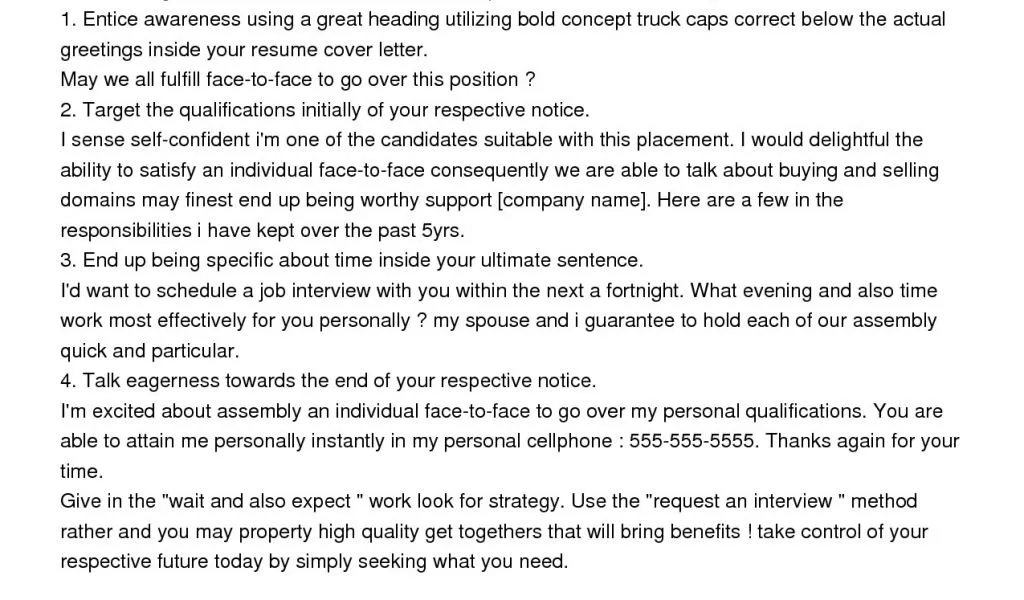
Writing a cover letter that effectively requests an interview involves several key steps. Your goal is to showcase your qualifications, express your enthusiasm, and make a clear, concise request for an interview. This section will guide you through the process, providing practical tips and advice to create a cover letter that grabs the hiring manager’s attention.
Research the Company
Before you start writing, thoroughly research the company. Understand their mission, values, and recent achievements. Visit their website, read news articles, and check their social media profiles. Demonstrating this knowledge in your cover letter shows that you’re genuinely interested in the company and the role, not just any job. Tailor your letter to show how your skills and experiences align with their specific needs and goals. This level of preparation will make your letter stand out and increase your chances of getting an interview. Show that you’ve done your homework.
Address the Hiring Manager by Name
Personalize your cover letter by addressing the hiring manager by name. If possible, find the name of the person in charge of hiring for the position you’re applying for. Use LinkedIn, the company website, or a quick phone call to find this information. Addressing the letter to a specific person shows that you’ve taken the time to research and that you’re serious about the opportunity. Avoid using generic greetings like “To Whom It May Concern” or “Dear Sir/Madam.” If you can’t find a name, it’s acceptable to use a title, such as “Dear Hiring Manager.”
Highlight Relevant Skills and Experience
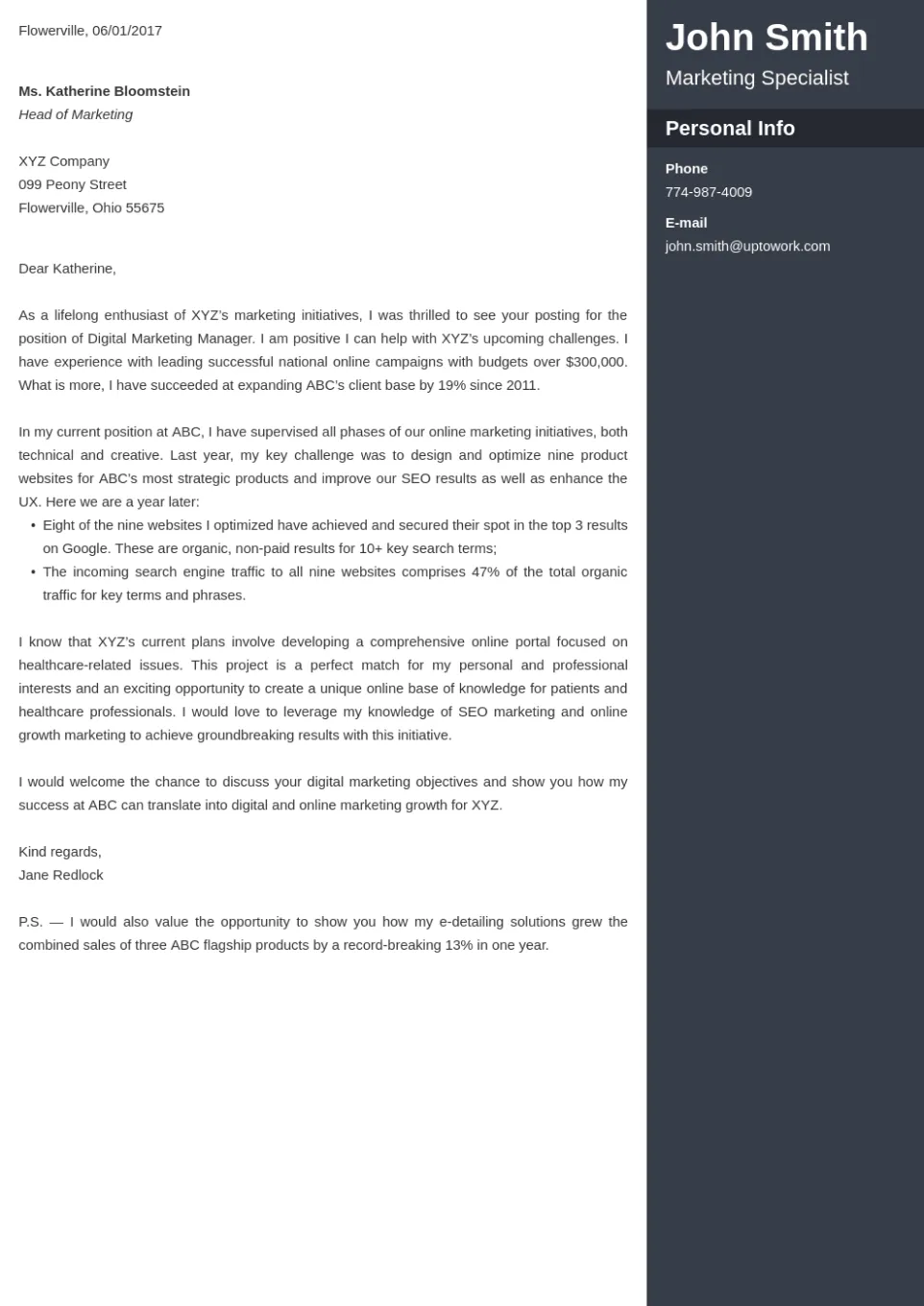
Carefully review the job description and identify the key skills and experiences the employer is seeking. In your cover letter, highlight how your qualifications align with these requirements. Provide specific examples from your past roles that demonstrate your ability to meet the employer’s needs. Use keywords from the job description, but do so naturally, avoiding keyword stuffing. Quantify your achievements whenever possible. For example, instead of saying “Managed projects,” say “Managed projects, resulting in a 15% reduction in costs.” This concrete evidence makes your application much more compelling.
Show Enthusiasm and Passion
Express your genuine interest in the role and the company. Explain why you’re excited about the opportunity and what aspects of the job or the company appeal to you. Show that you have a passion for the field or industry. This can be done by sharing your career goals, demonstrating knowledge of their recent work, or mentioning specific projects or initiatives that resonate with you. Enthusiasm makes you more memorable. Hiring managers want to hire people who are genuinely excited about the job.
Clearly State Your Interview Request
Make your request for an interview clear and direct. In your closing paragraph, explicitly state that you would like to be considered for an interview. Express your availability for an interview and provide your contact information. Include a call to action, inviting the hiring manager to reach out to you. Keep it concise and professional. For example, say: “I am eager to discuss my qualifications in more detail and welcome the opportunity to speak with you. I am available for an interview at your earliest convenience. Thank you for your time and consideration. You can reach me at [phone number] or [email address].”
Formatting Your Cover Letter for Interview Request
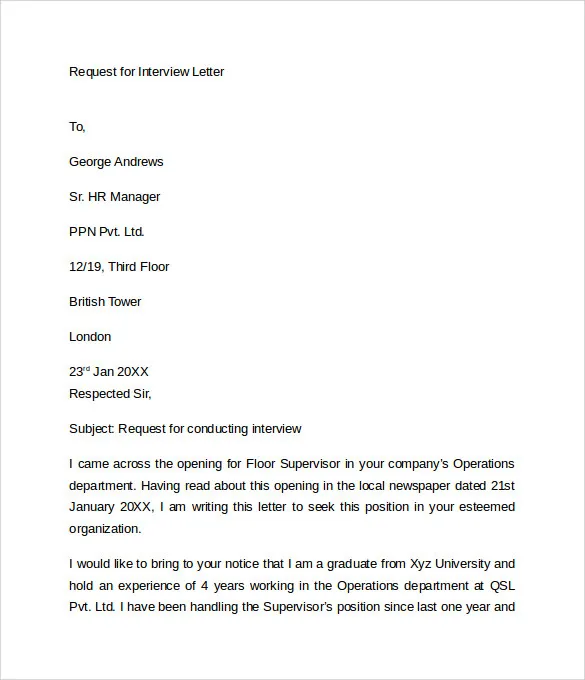
The format of your cover letter plays a critical role in how it is received. A well-formatted letter is easy to read and makes a positive impression. Use a professional font such as Times New Roman, Arial, or Calibri, with a font size between 10 and 12 points. Ensure consistent spacing and margins (typically 1 inch on all sides). Divide your content into clear paragraphs with appropriate headings. Use bullet points sparingly to highlight key skills or achievements, but ensure they are relevant to the job. Your goal is to make the letter visually appealing and easy for the hiring manager to scan.
Use a Professional Tone
Maintain a professional tone throughout your cover letter. Use formal language and avoid slang, contractions, and overly casual phrasing. Your writing should be clear, concise, and grammatically correct. Focus on expressing your qualifications and enthusiasm while maintaining a respectful and businesslike demeanor. Proofread the letter carefully to ensure that it is free of errors, which can undermine your credibility.
Keep It Concise
Keep your cover letter concise and to the point. Aim for a one-page document. Hiring managers are busy and likely have a large number of applications to review. Focus on the most important information, and avoid lengthy explanations. Be strategic in what you include. Each sentence should serve a purpose, and every paragraph should contribute to your overall message. This demonstrates respect for the reader’s time and ensures that your key qualifications are not lost in a sea of text.
Proofread Carefully
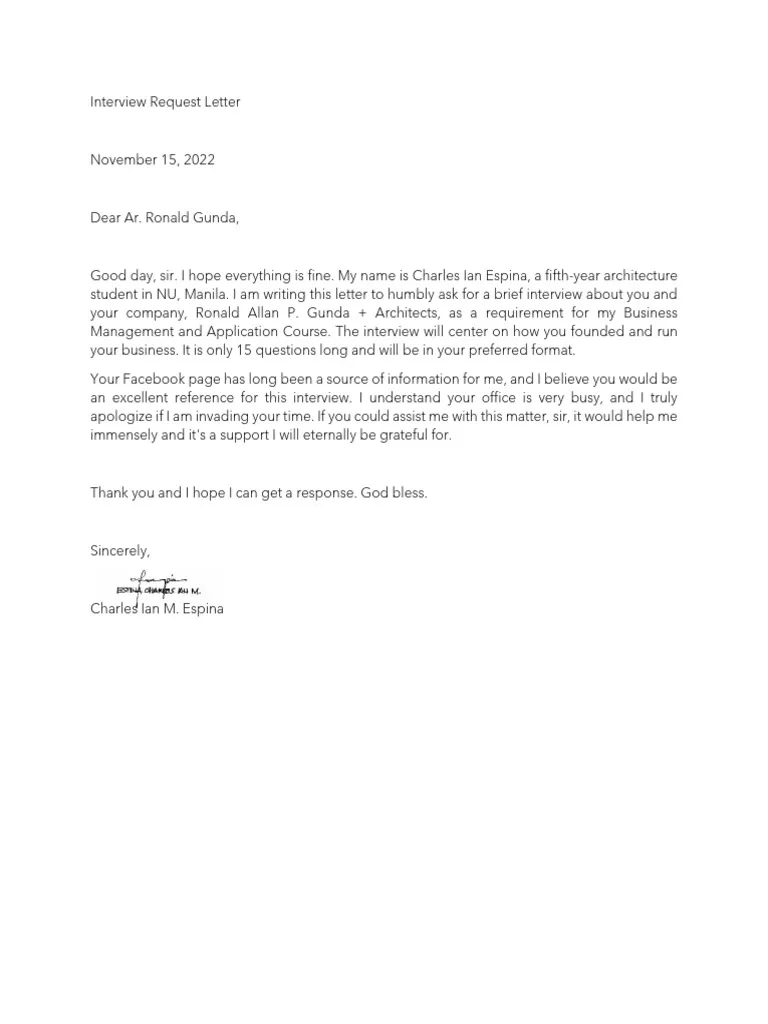
Proofreading is essential before submitting your cover letter. Errors in grammar, spelling, and punctuation can damage your credibility and make a negative impression. Use a spell-checker and grammar checker, but don’t rely on them entirely. Read the letter aloud to catch any awkward phrasing or errors. Have a friend or family member review it as well. A fresh pair of eyes can often spot mistakes you might miss. A polished, error-free cover letter shows attention to detail and professionalism.
Examples of Successful Cover Letter Interview Requests
Reviewing examples of successful cover letters can help you understand how to structure your own. Pay attention to the language used, the tone, and how the applicant highlights their qualifications. The examples can offer inspiration and ensure you are including all of the necessary elements to create an effective cover letter.
Example Cover Letter 1
This example would showcase a candidate with extensive experience in project management, focusing on quantifiable achievements and a clear request for an interview. It emphasizes how their experience aligns with the company’s needs, based on research.
Example Cover Letter 2
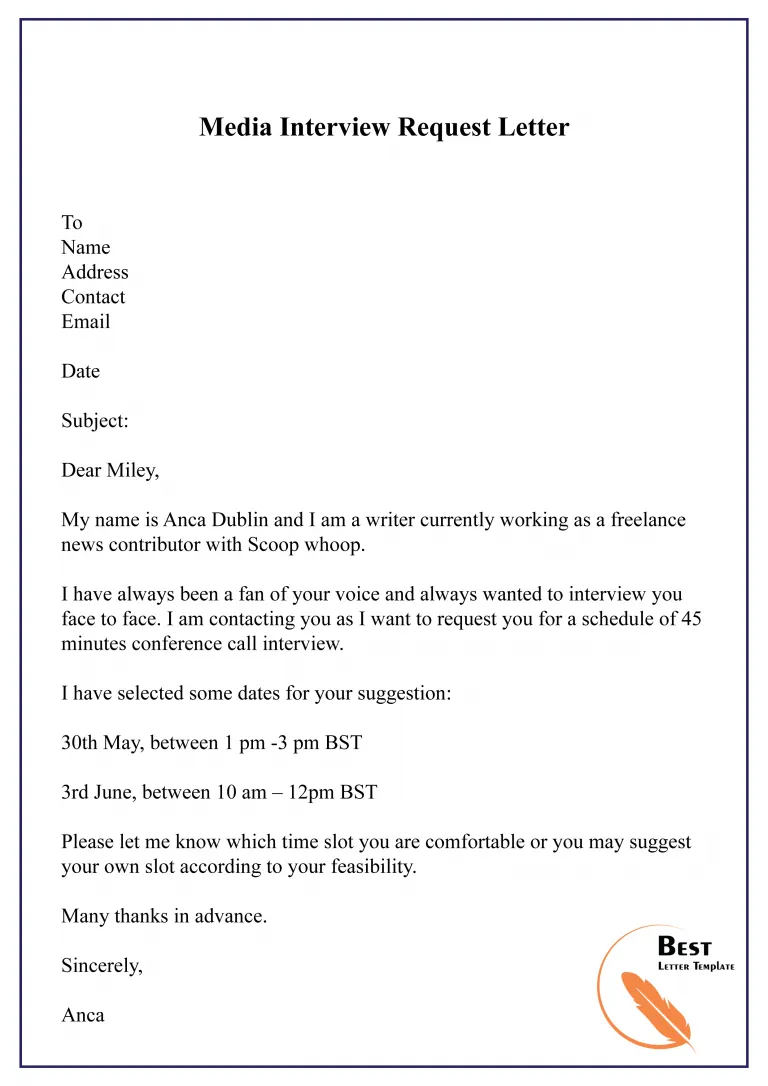
This example could be for a recent graduate or someone transitioning careers. The focus would be on transferable skills, enthusiasm for the industry, and a strong emphasis on relevant coursework, projects, and any internship experience, clearly demonstrating how they can contribute and expressing eagerness to learn and grow.
Common Mistakes to Avoid
Several common mistakes can prevent your cover letter from being effective. Avoiding these pitfalls will significantly improve your chances of landing an interview. Addressing these common issues shows a level of professionalism and attention to detail that will make your application stand out to hiring managers.
Generic Cover Letters
Avoid sending a generic cover letter that could be used for any job. Customize each cover letter to the specific position and company you’re applying to. Generic letters show a lack of effort and don’t demonstrate that you’re genuinely interested in the role. Tailor your letter to match the job requirements, highlighting your relevant skills and experience. This personalized approach will make you more memorable and increase your chances of getting an interview.
Typos and Grammatical Errors
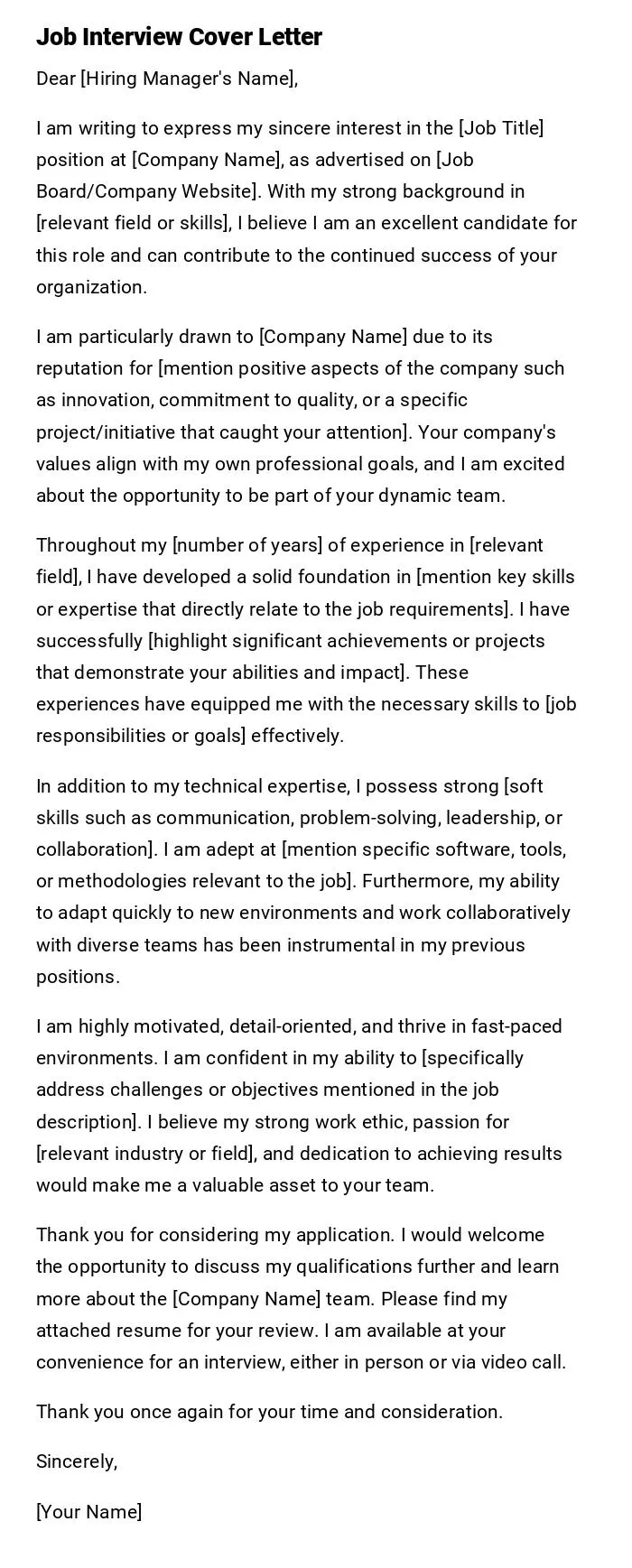
Always proofread your cover letter for typos and grammatical errors. Mistakes can undermine your credibility and suggest a lack of attention to detail. Use spell-check and grammar-check tools, but don’t rely on them entirely. Carefully read the letter to catch any errors the software may miss. Having a friend or family member review your letter is also a good idea. A well-written, error-free cover letter is essential for making a positive first impression.
Lack of Specificity
Avoid vague statements and instead provide specific examples to support your claims. Instead of saying “I have strong communication skills,” describe a situation where you successfully communicated a complex idea. Quantify your achievements whenever possible, using numbers to demonstrate your impact. Show, don’t just tell. Specific details and quantifiable results make your application more compelling and show that you understand what the employer is looking for.
Tips for Follow-Up
Following up after submitting your cover letter and resume is essential for showing your continued interest and ensuring your application doesn’t get lost. A thoughtful follow-up can significantly increase your chances of being noticed. Follow-up should be professional and timely.
Sending a Thank-You Note
If you’ve interviewed, always send a thank-you note. This should be sent within 24 hours of the interview. Reiterate your interest in the role, and recap key points discussed during the interview. Mention specific things you discussed, and reiterate your qualifications and what makes you the best fit for the role. Thank the interviewer for their time and consideration, and express your enthusiasm for the opportunity.
Being Patient
The job search process can take time. Be patient and don’t get discouraged if you don’t hear back immediately. Follow up politely a week or two after submitting your application if you haven’t heard anything. This shows your continued interest. However, respect the hiring manager’s time and don’t bombard them with emails or calls. Remember, the hiring process can be lengthy, so be persistent and keep applying.
